What's the point of preservation if it just leads to exclusive playgrounds for the rich to park their money. A victorian / edwardian on the outside, gutted and reno'd to oblivion on the inside..
We'll all die looking for apartments while someone decides what wolf range they want for their new bellwoods house reno.
Toronto's best characteristic? If you consider polarizing wealth inequality our shining beacon, then sure.
Inequality is not caused by a few thousand Victorian/Edwardian homes; which, by the way, I'm not opposed to seeing become rentals, or being divided into apartments inside.
Inequality is caused by low wages, primarily, by inordinate un/under employment, and for those dependent on the state, anemic social assistance rates and low old-age pensions.
All of that can be easily addressed without harming the livability of the city.
Raise minimum wage, over a couple of years to $21 per hour (same as Seattle, Wa); add in a premium for weekend/evening/overnight work, just like Australia does (ie. minimum wage for evening and weekends is 10% higher, 20% higher for overnights.
Boost the retirement age to 70, like most of Scandinavia has, and reinvest those savings to boost pensions by 40% on average. Slant it slightly so that that couples see an increase of 35%; singles an increase of 45%
Raise disability benefits to $2,000 per month (from $1,200)
Raise Social Assistance to at least $1,400 per month, and penalty-free allowance for working income of at least $600 per month on top of that.
Its easy, affordable and there is precedent for all of the above.
****
Housing supply is best addressed first, by curtailing demand, cutting foreign-student volumes back to what they were 8-10 years ago (1/2 the current level), which would free up 25,000 places to live in Toronto.
Then curtail immigration, until housing supply ratios are more reasonable. (not a freeze, just a reduction to same level as 8-10 years ago, with a cap that will lift as soon as housing supply is adequate).
Legalize multi-family/rental everywhere (that's not about built-form, but use); by all means upzone major streets.
Reduce the cost of housing supply by banning all non-resident ownership of SFH (including condos).
Eliminate speculative investment in housing by raising capital gains inclusion to 100%; and by eliminating the exception for principle residences.
There, problem solved with real-world solutions that keep the City a nice place to live and without promoting climate change as any proposal to rip out most of the mature trees in the City would.





